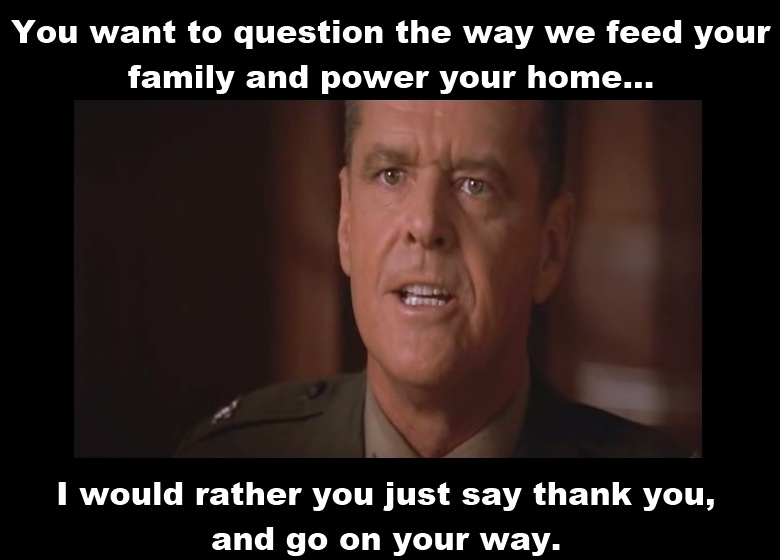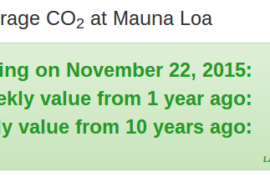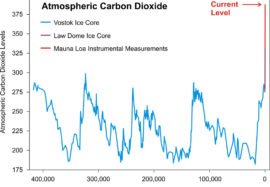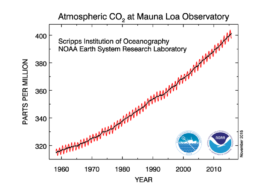This is a three part commentary on the environment. Part I follows below, Part II is here. Part III is here.
For those of you Republican readers — and on many issues I count myself among you — here’s your warning: I’m about to challenge the party’s position and the way many of us think about the environment.
I don’t understand why we aren’t all environmentalists. Our parents taught us to be environmentalists; we’re teaching our kids today to be environmentalists. But as conservative minded adults (perhaps influenced by the partially-partisan news we all consume), we’ve allowed hypocrisy to invade our thinking and guide our actions.
Think about these time-honored traditions:
- Clean your room
- Make your bed
- Pick up after yourself
- Do the dishes
Or perhaps you’re a hockey fan. Have you noticed that after an hour of skating, we always take a break to stop, clean-up, and renew? And who among the audience isn’t somewhat transfixed by the magical properties of the Zamboni — is it not the pinnacle of what can be achieved when ingenuity is applied to an environmental concern? But praise for the Zamboni aside, my point is this: without sound environmental policy, our favorite skating rinks would be miserable places to play indeed.
Or maybe you’re a golfer. Even those who’ve never swung a club know it’s a player’s responsibility to rake sand traps. And new golfers are quickly introduced to replacing divots and fixing ball marks. It’s all done in the name of etiquette; it’s the responsibility of all those who play to help maintain the course for those who come after.
In our micro-worlds and daily lives, environmentalism as a trait is accepted and celebrated. We clean up after ourselves. We take care of our own little environments because if we don’t, the consequences are obvious and uncomfortable. For most, it’s a simple matter of right and wrong.
Unfortunately, when the effects of our lifestyles, when the effects of our daily lives are not so immediately obvious — we’re more than willing to let the consequences fall to the next in line. It’s sad but true commentary on the state of being human.
But what I find most unfortunate about the current conservative mindset on the environment is our thinking has become hardened. The political discussion is closed. The job is done. The environment is no longer threatened. The only good environmental policy is dead environmental policy.
I’ve no doubt taken my point to the extreme, but if you cracked a smile after the last sentence, then I suspect there’s a kernel of truth in what I wrote. That hardened thinking troubles me. Here’s why: if there’s a problem that needs to be solved, how do you find that solution when one party in the debate doesn’t acknowledge it exists?
Part II: Let’s Ask the Right Questions
Yesterday in Part I of this commentary on the Republican position on the environment I wondered aloud if we as a party have allowed some hypocrisy to enter our thinking.
Today I’m going to unpack my thinking as it applies to the most notorious of environmental concerns — climate change. When I boil it down, I think the Republicans are in the wrong of this issue. My reasons for thinking this way follow next.
The Three Questions…
First, I see climate change as a scientific issue — are we causing damage to the environment? If we answer yes, I think we next need to consider our moral responsibility — if we’re causing damage, should we do something about it? And third, as a political issue, if we answer yes to the first two questions — what should we do about it?
Are we changing the environment?
If we look at the 50+ years of hard data collected on the amount of CO2 in the atmosphere, there’s a strong indicator that says yes, something is changing. Add the ice core record that dates back 650,000 years and we get a clear picture that CO2 concentrations in the atmosphere are the highest they’ve ever been.
Bear in mind, I’m not speculating on what that rise in CO2 will do to the climate. The only point I’m qualifying as fact is that CO2 levels in the atmosphere are the highest they’ve been — by a lot — dating back to the beginning of when we can measure it.
But is human activity the cause? Is it just a coincidence that this meteoric rise in CO2 concentrations takes place alongside the industrial revolution and the exponential growth of the human species? Possibly, correlation does not imply causation. But if I look back on history — even of North Dakota, I see clear examples of the fact that we as humans are capable of changing our environment on a wide and dramatic scale. Don’t believe me? Ask anybody who lived through the dust storms of the dirty thirties to talk about man-made climate change.
So in spite of the fact that I’m exposing my argument to a causal fallacy, I’m willing to answer yes. I think the evidence is pretty clear that we as humans are responsible for changing the atmosphere.
That leads me to the second question.
Yes, We Are Changing the Environment, Should We Do Something About It?
So you know and don’t take it personally, I’m framing up a direct assault on two of the most common conservative arguments on climate change and environmental issues in general. First, I hear a lot of Republican friends say we shouldn’t do anything because it’s too expensive (the economy defense). The other argument I hear often is we shouldn’t do anything because it won’t make a difference (the China defense).
But I’ve just jumped the gun. I did so intentionally because I think that’s the road many of my conservative friends take. The question here isn’t, “how are we going to solve this problem and what’s it going to cost?” Our question is, “should we do something about the damage we’re causing?”
The answer is yes. And you’ve already read my justification. It’s a matter of accepting responsibility. It’s a matter of right and wrong. It’s a matter of scaling up our worldview to avoid the trap of hypocritical thinking.
Choosing to avoid action on a problem because the heretofore proposed remedies are culturally inconvenient or excessively expensive is not a lesson we should be passing to the next generation. For the past 150 years we as a species have been making a mess; we’ve been having a party. We share culpability with the generations before us, but unfortunately, full awareness of our circumstance is now just dawning on us. We have a personal responsibility to — at the very least — begin the clean up.
Would you allow your kid to avoid cleaning up his or her room because the friend down the street doesn’t have to? Would you let your kid avoid cleaning his or her room because he or she would rather play video games? Responsible parents would say no.
And we as adults must now accept that same responsibility with regards to the environment.
Part III: How We Got Here, Where We Should Head Next
So, I believe we have a responsibility to do something. The next question becomes, “what should we do about the damage we’re causing?” But before a jump into solutions, allow me a short interlude to theorize on how we as North Dakotans arrived at our present state of mind — the one where ‘environmentalist’ is a dirty word, and we hate the E.P.A.
Why We Rightfully Hate the E.P.A.
As a small-population state, we have little political sway, but our main industries like agriculture, oil, and coal all have a large environmental footprint. We are an outlier. Consequently, we feel the heavy hand of federal environmental policy more acutely than people in other places. It affects us personally; it affects people we know.
Add that to the fact that we as a state produce far more energy and food than we need ourselves and our Colonel Jessup-esque attitude seems appropriate.

So, We’re Justified in Our Contempt, But What’s it Getting Us?
Our current attitude toward environmental issues and the E.P.A. are 100% justifiable; we are right to think the way we do. But that doesn’t mean our oppositional attitude is serving our interests well.
In the world of politics, policy and public opinion, the Republican position of denial and feet dragging is becoming a liability. It’s holding the party back. It’s pushing away some in the rational middle. And we continue to think this way because why? Because we’ve earned so many political victories from it? In case you haven’t noticed, it seems like environmental policy is moving forward in spite of Republican majority opposition in both the House and Senate.
What Should We Do About the Damage We’re Doing to the Environment?
First of all, I won’t pretend to have any of the answers to that question. I’m not an environmental scientist, and the global environment has proven to be a pretty complex system — one quite capable of countering best intentions with unintended consequences.
And that’s just the science side of the equation. Add economic consequences and then politics to the equation and even most optimistic part of me begins to lose faith in the viability of any political policy.
That said if I look specifically at the Republican party and the attitudes we as North Dakotans carry, I do have some thoughts on some things that may help.
In the road trip of political debate on the environment, it seems like Republicans are the passenger riding in the car that has crossed their arms and stopped talking. It makes me wonder if we should be surprised that we no longer have a say in where the car stops?
One: Remove Head From Sand
First, let’s pull our heads out of the sand leave the “it isn’t happening” position behind. The data has become crystal clear; we are changing the atmosphere. The longer we deny it, the more credibility the party loses. Not to mention, it’s a position of denial is rich in comedic fodder.
https://www.youtube.com/watch?v=qJh6EQ5gv7g
Two: Start Talking Solutions
Second, let’s get a credible seat at the policy table. Let’s accept some responsibility for our actions so we can have a legitimate voice in conversations about solutions. Simply saying no to every idea brought forth is not an endearing trait and I believe it will soon start costing the party some of its moderate voters.
Republicans should have a monopoly on the free-market solution conversation. And there are strong arguments that can be made against using government subsidies to prop up false-hope industries and solutions. But none of them will matter as long as we’re the party that just says “no”.
Three: Make it Personal
Third, let’s champion personal responsibility for the environment the same way we champion personal responsibility on financial and fiscal matters. It means we’d each of us have to become more environmentally conscious adults. It would also probably mean we have to stop using the ‘environmentalist’ label as a put-down.
And perhaps our newly adopted personal attitudes will be reflected in our businesses and jobs; maybe that would shape more wide scale action in our respective industries. Wouldn’t that be something? Sort of a, “only you can stop the E.P.A.” campaign that would make their policy irrelevant and unneeded. That’s a far-fetched long-game idea, but at least it’s an avenue that’s within our control.
Full Disclosure: The Minot Voice Will Be Proudly Pro Environment
In the ongoing effort to make our positions known and transparent, you now know where the Minot Voice will stand. Environmental issues shouldn’t be ignored. As we get back to more regular publishing, you’ll find us trying to stay focused on local issues, but in the case of the environment we’ll be taking a notably global perspective.







I agree that farming does leave a footprint, but North Dakota has a long ways to go compared to other states. At the beginning of the year I attended a seminar about “improving your ground” or something like that. One of the presenters was talking about how in some states where cotton has been grown continuously from year to year they no longer can grow any crops. The reason for this is because they never used a crop rotation and they have just mined everything out of the ground. When they did soil testing they found there was no biomass, meaning there were no organisms alive in the ground anymore because there was nothing for them to feed on.
I know there are farmers in North Dakota that still cultivate and harrow their ground every chance they get, it is bad for the soil and kills organisms in the soil that are needed to help grow a good crop. On the other hand though there are a lot of farmers that have embraced no-till/minimum till practices.
My point is even through agriculture does leave a footprint I’m willing to bet most of the farmers in the state are doing their best to no only take care of their land, but improve it too.
Hi Shawn, you’ll get no argument from me. From what I’ve seen I think most farmers are acting as good stewards of the land. It seems we as North Dakotans identified that as in our best interest a long time ago. I’d guess that also contributes to our cultural distaste for EPA regulation because we’re already doing a pretty good job. My main argument is that the polemic rhetoric I hear coming from Republicans and conservatives on the environment and denial of clear, obvious damage (global CO2) is no longer serving the party or the environment well.